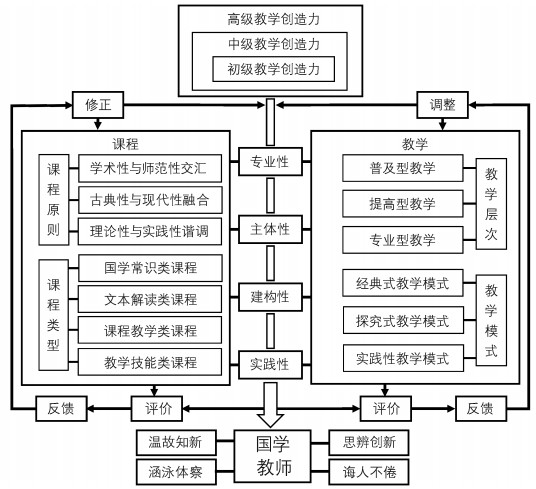-
近年来,在政府、民间和学术界的共同倡导下,国学教育持续升温,逐渐形成一种历久弥新的教育文化。据统计,目前,全国以“堂、塾、馆、院”命名的民办国学教育机构已达三千多家,开设国学课程的幼儿园、小学、中学数以万计,高校成立的国学研究院或相关国学研究机构已近二十家,全国有数千万人学习国学[1]。在国学教育如火如荼的同时,国学师资问题却日益凸显,并成为制约国学教育健康发展的一大瓶颈。由于国学教育被废止多年,严格意义上的国学教师数量严重不足;同时,从业者的素质良莠不齐,一些未经专业培训的国学教师充斥国学教育第一线,他们缺乏教育理论指导,教学手段落后、教学效果不佳,给国学教育带来了消极的影响。新课程改革背景下,教师的教学能力正在从“传递力”向“创造力”转变,体现出教师角色由“控制者”向“引领者”转型[2]。因此,基于教学创造力提升的国学师资培养值得我们去认真地加以研究。
全文HTML
-
一种文化要成为主流必须通过教育使其深入人心,正所谓“建国君民,教学为先”(《礼记·学记》)。国学的传播、普及与弘扬,需要扎根中小学教育,从青少年入手。当前,国学成为中小学法定课程已成必然之势,青少年将成为传承、弘扬和创新国学的新生力量,他们决定着国学的未来。而中小学生能否学好国学,关键在于教师[3]。“中小学国学教育的开展,最为核心的一个问题即是师资的培养,无论是国学教育价值的认定、内容的甄选还是方法的运用,其最终效果如何,可以说在很大程度上都取决于有无合格的国学教育师资。事实上,师资尤其是优秀师资的匮乏恰是当今中小学国学教育中最为薄弱的一个环节。”[4]因此,要有效开展传统文化教育,必须把师资培训工作尤其是职前教师培养放在十分重要的位置[5]。
就国学师资问题,学者们也提出了诸多解决方案,如:在行政主导下,加强现有师资的继续教育[6];建立跨学科、跨学校的共享机制和平台,实现临时师资和正式师资的共同发展[7];将国学教师资格证纳入国家教师资格证体系,确立中小学国学教师准入制度,以提高国学师资水平[8];允许民间私塾尝试进行国学师资培养,此种培养可以诵读经典、释疑答惑为主,且时间不长(如七天)[9];高等院校在培养中小学师资时开展国学教育,为社会输送国学教育师资,提升师德素养[10]。笔者曾参加过国家教育行政学院举办的国学师资培训,该培训即基本上是以儒学文本解读、经典诵读为主。
目前,国学师资培养基本限于国学经典文本解读或者道德教化,普遍忽视国学教学创造力的训练,而且国学师资培养理论研究的系统性、专业性不足,尚未形成稳定、可行的课程体系和教学模式,缺乏实践操作性。中小学国学教师的专业成长更多地是依靠自主摸索,因而走了许多弯路,职前教师教育未能在教师“敏而好学”和“敏而会学”的终身学习中发挥应有的作用。
由上述可见,国学师资培养已经引起了广泛的重视,取得了一定的研究成果,并进行了相关的实践探索,但仍处于起步阶段,许多问题还需要深入研究和认真解决,尤其是教学创造力缺失的问题。我们亟需明确方向,优化培养环境,构建完整的以国学教学创造力为核心的国学师资培养体系。
-
为了便于研究和说明国学师资培养问题,先明确几个相关概念。所谓“国学”,是指以儒学为核心的中国传统思想文化。所谓“国学教育”,指以中国传统思想文化为核心内容,以培养人们的传统文化素养、人文精神、民族意识以及健全人格为主要目标的教育。“国学师资”则有两种含义。一是指教授国学的专职教师。当前,国学尚未正式纳入国家课程体系,专门的国学教育只是在民间机构和部分中小学中开展,因此此类国学师资的需求量暂时还不大,但一旦国学成为正式的国家课程,国学教师的需求量会急剧增加,我们应提前做好相应的师资储备。二是指具有国学素养和国学教育意识的学科教师,尤其是语文、政治、历史、艺术等人文社会学科的教师,他们是当前在中小学从事国学教育的主力军。而所谓“国学师资培养”,就是通过理论学习、课程建构、实践教学,使学习者成为掌握一定的国学教学技能、具备一定的国学教学创造力、能够熟练地进行国学教学的人才。
本文重点强调的“国学教学创造力”,是指在中小学的国学教学中,教师在现代教育理论的指导下,创造性地解读国学的课程文本、创立课程体系、创新教学方法、创建教学模式,以形成良好国学教学效果的能力。它可以分为三个层次:一是初级教学创造力,指教师在自身现有教学能力的基础上,不断提高、创新的能力;二是中级教学创造力,指教师经过模仿、借鉴或改革,创造出具有一定影响力的教学模式,并能够在相当的范围内得到认可的能力;三是高级教学创造力,指教师形成一定的教育哲学,创造出国内或国际领先的教学模式的能力。作为一名国学教师,不仅能够正确解读国学的课程文本,更应该具有较强的教学创新与创造能力。如果说国学研究者的核心素养体现于国学课程文本的解读、辨析与研究,国学实践者的核心素养在于在国学熏陶下的道德与人格的完善,那么国学教育者的核心素养便是国学教学创造力。国学教师只有具备了国学教学创造力,其国学教育才能由自发走向自觉,从而提升国学教育的品位。
具体来说,国学师资的培养目标可以分为以下四个层面:一是温故知新,掌握国学常识,从现代性角度去理解国学内涵,与日常生活结合去解读国学的课程文本,成为国学的研习者;二是涵泳、体察,从“为己之学”的视角来提高自我修养,提升作为未来教师的精神境界,成为国学的实践者;三是思辨创新,培养辩证地分析中国传统文化中精华与糟粕的能力,提升教育教学理论修养,能够自主地解读与构建中小学国学课程,成为国学的建构者;四是诲人不倦,掌握国学教育的教学方法与策略,构建中小学国学课堂教学模式,成为国学的教学者。
一. 问题提出
二. 相关概念的界定
-
传承中华优秀传统文化已经上升为国家战略,国学教育是弘扬中华优秀传统文化、增强文化自信的重要体现,国学师资培养则是国学教育和谐健康发展的必要前提。2013年,党的十八届三中全会提出“完善中华优秀传统文化教育”。2014年,教育部出台《完善中华优秀传统文化教育指导纲要》,明确要求:全面提升中华优秀传统文化教育的师资队伍水平,在师范院校开设中华优秀传统文化课程,培养和造就一批中华优秀传统文化教学名师和学科领军人才。2017年初,中共中央办公厅、国务院办公厅印发《关于实施中华优秀传统文化传承发展工程的意见》,提出“加强面向全体教师的中华文化教育培训,全面提升师资队伍水平”。可见,国学师资培养既是实施党和国家弘扬中华优秀传统文化的战略需要,也是增强文化自信的实践体现,更是落实立德树人根本任务的重要途径。
-
青少年是国家的未来,是传承国学的主体。国学师资培养可以充分发挥中华优秀传统文化的育人功能,是增强文化自信的必要途径。国学教育对提升未来教师的文化品位和精神境界有着不可替代的作用。职前国学师资培养的对象主要是在校大学生,他们本身是正在接受教育的青年,又是即将从事国学教育的未来教师。通过国学师资培养,提高职前国学师资的教学创造力,不仅可以重塑中国的教育生态,而且可以推进思想文化建设,形成具有国际视野、时代精神和本土特色的新型文化形态。
-
加强国学师资培养,一方面可以缓解当前国学师资不足的问题,同时也可以提升国学教师的教学创造力,进而促进国学教育健康和可持续发展。虽然当前教师教育已经开始从技能训练转向教师文化引导,但国学师资培养相对滞后,国学教学与其他学科教学又有着较大差别,相关教学创造力的研究与培养仍然严重缺失。因此,在提升国学教师传统文化修养的同时,培养他们从事国学教育的基本技能依然是国学师资培养的重点。
国学师资培养是教师教育的新课题,也是创新教师教育模式的一种新尝试。国学教育的独特性要求国学师资具有独特的教学创造力,这是一个全新的课题,需要师资培训者不断进行研究、探索与实践,通过不断地尝试形成国学师资培养的有效模式。
一. 国学师资培养是增强文化自信的重要体现
二. 国学师资培养是增强文化自信的必要途径
三. 国学师资培养是国学教育健康发展的关键一环
-
要切实培养国学教师的教学创造力,就必须使其具有自主创新的能力。在国学师资培养中,除了常用的教育原则之外,还需要遵循以下原则。一是专业性原则。即:体现国学教育的专业特色,突出国学教学创造力培养,用现代课程与教学理论指导国学教学实践。二是主体性原则。即:学习过程中学习者要敏而好学、切己体察,既要学习国学的课程文本,又要体会国学的精神内涵,在“诚意”“正心”上下功夫,以彰显学习者的主体地位与主动精神。三是建构性原则。即:在授课中,师生双方要实现教学相长,从“道问学”走向“尊德性”,对古代经典进行现代解析与创造性转化,创生国学课程的新意涵,创建国学教育的新模式。四是实践性原则。即:学习者要到课堂中去实践教学理论,要做到“知行合一”,在日常生活中主动践行国学,自觉成为“文质彬彬”的君子。五是互动性原则。即:传授者、学习者要结合课程文本共同切磋、琢磨,形成良性互动,让学习者体会“自诚明”和“自明诚”。
由于时代发展的需要,国学师资培养已成为当务之急,但培养具有教学创造力的国学师资并非易事。
首先,国学师资培养具有独特性。作为国学教师,他们不仅要掌握和理解国学,还要能够胜任国学的传承任务,要具备国学教学的基本能力,因而国学师资的培养不同于一般教师的培养。新形势、新要求下,古老的国学教育已成为一门全新的学问,不仅要传承被阻断的教学体系,而且还面临着现代转型,国学师资培养的独特性更加凸显。
其次,国学师资培养具有复杂性。国学教育不同于一般的普通课程,它融通古今、通达天地、贯通人生。不论是从课程目标、课程内容、课程实施,还是课程管理和课程评价而言,国学教育都呈现出一定程度的复杂性,因此其师资培养也具有相当的挑战性。同时,国学教育的重要性虽然已毋庸置疑,各界对此已形成共识,但它尚未正式进入国家课程体系,这种微妙的地位,也加剧了国学师资培养的复杂性。
国学师资培养虽面临诸多挑战,但也并非不可行。其教学策略可以借鉴古代的教学方式以及我国台湾地区的先进经验,实现现代转型。
-
课程体系的建构是国学师资培养的重要基础,也是培养和提升教学创造力的前提条件。课程设计要体现三个基本原则。一是学术性与师范性的交融。国学的课程文本的解读、知识的掌握是国学师资培养的根基和前提,国学教学创造力则是师资培养的核心和重点。二者是相互推动和促进的关系,缺少国学知识则教学创造力无从谈起,缺少教学创造力则不足以成为优秀的国学教师。二是古典性与现代性的融合。国学作为一种传统文化,它的演进过程、诠释角度与践行路径都不可避免地带有鲜明的时代烙印。在国学课程的建构与设计中,我们既要合理地继承古代文化的精华,又要从现代性的角度去观照它、解读它,使国学经典在21世纪的今天焕发出新的生机、呈现出新的风采。三是理论性与实践性的谐调。国学师资培养要使学习者正确地理解国学经典的内涵,合理地阐释其现代意境,并掌握现代课程与教学的基本理论,学会将教育学的原理与国学教学进行有机结合。同时,学习者不仅能够自觉地践行国学精神,而且能够掌握国学教学技能,熟练、有效地进行国学教学。
“教师教育是一种培养师资的专业教育,教师的专业发展需要相应的课程体系支持。”[11]传统教师教育的课程体系已经不能适应时代发展的需要,更不能满足国学师资培养的需要。有学者甚至提出将儿童学、教师学、教材学作为教师教育的核心课程[2]。笔者认为,可以将国学师资培养的课程划分为以下四种类型:
一是国学常识类课程,旨在构建陈述性知识,提高国学认知力。此类课程主要讲解儒、墨、道、法、佛等学派的常识,让学习者理解国学的主要特色;梳理国学的发展流变,让学习者认识国学传承的规律与趋势;分析国学与政治的关系,让学习者了解国学融入老百姓日常生活的情况,体会国学的融合性、指导性和实践性。同时,通过分析研讨与亲身实践,让学习者理解国学产生的逻辑和发展脉络,体会中华传统文化的精神内涵,并进而认识到,国学不是一门学问,或者一个学科,而是中华民族的人生智慧、道德根基和文化主脉,它深刻地影响着国人的人生观、世界观、价值观,是确立文化自信不可或缺的文化基因。
二是文本解读类课程,旨在构建本体性知识,提高国学理解力。可选择经典国学内容编排课程,从《三字经》《千字文》《弟子规》《千家诗》等,到《大学》《中庸》《论语》《孟子》以及《道德经》《庄子》《墨子》《韩非子》等,进而修习《诗经》《尚书》《礼记》《易经》《春秋》等,并要求学习者进行诵读。在编排课程时,要选择与当前社会生活密切相关的经典内容,其余内容则可作为选修课程。研习者通过学习此类课程,可以深入理解国学经典,体悟其中蕴含的文化精神,并将其融入日常生活之中。同时,由于国学内容庞杂,国学教师应明确作为中华优秀传统文化的国学的标准,学会选择国学的经典内容,进而自觉推进国学教育的健康发展。
三是课程教学类课程,旨在构建策略性知识,提高国学建构力。可设置“国学课程与教学论”课程,使教师能够在解读文本的基础上,自己辨析、判断国学经典,建构中小学需要的课程内容。在教学中,可适当增加案例教学,让学习者通过案例学习、见习、实习等方式,熟悉备课、上课、练习、实践、评价等国学课堂教学的流程,熟练运用国学教学的原则和教学方法,形成有效的国学课堂教学模式。
四是教学技能类课程,旨在构建实践性知识,提高国学执行力。学习者通过修习毛笔字、楹联、诗词、古代散文、国画、基本礼仪等,体会国学的真谛,提高国学教学的技能。同时积极学习网络多媒体技术,充分利用QQ群、博客、微信、微博等新媒体推进教学,熟练掌握微课、翻转课堂、慕课等“互联网+”时代的教学形式。
-
教学是国学师资培养的中心环节,是提高国学师资教学创造力的基本途径。国学师资培养要突破传统教学模式的束缚,从现代性的视角来审视国学,突出国学教学创造力的培养,构建适应时代发展需要的国学师资培养教学模式。
针对不同的人群需求,国学师资培养的教学可分为三个层次。第一个层次是普及型教学。这种教学旨在让学习者能够正确理解基本的国学经典,掌握初步的国学教学能力,使学习者成为国学的虔信者,以传国学之道。第二个层次是提高型教学。此种教学旨在让学习者研读国学经典,研究国学课程与教学,提高国学的教学创造力,使学习者成为国学的践行者,以授国学之业。第三个层次是专业型教学。该教学旨在让学习者深入理解国学经典,加强对国学课程和教学的理论研究,强化国学教学创造力,使学习者成为国学的创新者,以解国学之惑。
在具体的教学活动中,不同类型的课程可采用不同的教学模式。传统的知识型教学或实验操作型教学都不能满足国学师资培养的需要,笔者认为,可以借鉴通识教育的模式来改进国学教学。具体来说,国学师资培养的教学模式可以分为三种。一是经典式教学模式,主要适用于理论解析、文本解读类教学。可以借鉴赫尔巴特提出的“明了—联想—系统—方法”的思维程序。此类教学要从程序性教学转向情境性教学,创设更多的教学情境,以增加学习者的兴趣,激发其主动学习和探索的积极性。二是探究式教学模式,主要适用于理论内化、文本辨析类教学。可以使用五步教学程序,即准备知识背景—明确选题—讨论研究—检验假设—得出结论。此类教学要从他主性研讨转向自主性探究,引导学习者发挥主体精神,主动自觉地探究问题,以逐步养成终身学习的能力。三是实践式教学模式,主要适用于课程设计、课堂教学、见习实习等教学活动。教学程序可设计为:实践动员—实践准备—实践活动—记录统计—实践反思。此类教学要从技能性实践转向反思性实践,运用教育原理对教学实践进行回顾与反思,从而提高教学智慧,促进专业成长。
综上,国学师资教学创造力培养可参见图 1。
一. 加强自主创新是培养和提升国学师资教学创造力的基本要义
二. 创新课程体系是培养和提升国学师资教学创造力的必要前提
三. 创新教学模式是培养和提升国学师资教学创造力的中心环节
-
国学师资培养是传承优秀传统文化的一项急迫任务,是持续、健康地进行国学教育的基本保证。国学师资应当具有强烈的家国情怀、鲜明的时代精神、知行合一的教学理念,这样才能形成卓越的教学创造力,推进国学课程体系和教学模式的创造性转化。国学师资将国学智慧融合在自我专业发展的进程之中,围绕教学创造力,形成内生式专业发展逻辑,成为国学教育自主发展的“源头活水”。只有国学师资培养健康、和谐发展,国学才能真正为中华民族的伟大复兴提供强大的精神动力,才能成为文化自信的重要源泉。




 下载:
下载: